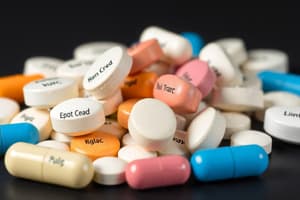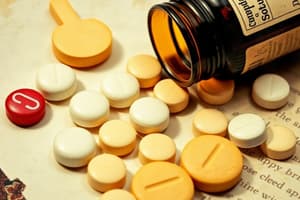Podcast
Questions and Answers
What is the primary function of a depressant?
What is the primary function of a depressant?
- Promotes defecation
- Lowers functional capacity (correct)
- Induces vomiting
- Increases functional activity
Which medication type is defined as inducing and increasing the discharge of urine?
Which medication type is defined as inducing and increasing the discharge of urine?
- Stimulant
- Diuretic (correct)
- Narcotic
- Laxative
What effect does an emetic have on the body?
What effect does an emetic have on the body?
- Induces vomiting (correct)
- Causes sleep
- Prevents disease development
- Promotes defecation
Which substance is described as promoting defecation by a mild action?
Which substance is described as promoting defecation by a mild action?
What is the purpose of a prophylactic medication?
What is the purpose of a prophylactic medication?
What is the main effect of a narcotic on an individual?
What is the main effect of a narcotic on an individual?
Where is the site of injection for intramuscular injections?
Where is the site of injection for intramuscular injections?
When would a drug be administered via intramuscular injection?
When would a drug be administered via intramuscular injection?
Which muscle location is NOT commonly used for intramuscular injections?
Which muscle location is NOT commonly used for intramuscular injections?
What angle is recommended for administering intramuscular injections?
What angle is recommended for administering intramuscular injections?
What is the primary intention of administering MSO4 based on the text?
What is the primary intention of administering MSO4 based on the text?
Why might a drug be administered via intramuscular injection instead of subcutaneously?
Why might a drug be administered via intramuscular injection instead of subcutaneously?
Which term describes the amount of a therapeutic agent that causes poison or death?
Which term describes the amount of a therapeutic agent that causes poison or death?
Which type of drug effect involves increased strength of myocardial contractions?
Which type of drug effect involves increased strength of myocardial contractions?
What is the purpose of a drug's Generic Name according to the text?
What is the purpose of a drug's Generic Name according to the text?
Which route of administration involves using suppositories and creams?
Which route of administration involves using suppositories and creams?
What is the effect that may justify discontinuation of a drug?
What is the effect that may justify discontinuation of a drug?
What defines the minimum amount of a therapeutic agent needed to produce its desired effect?
What defines the minimum amount of a therapeutic agent needed to produce its desired effect?
What is the Right Approach emphasized in the text regarding drug administration?
What is the Right Approach emphasized in the text regarding drug administration?
In what situation would Drug Allergy typically occur?
In what situation would Drug Allergy typically occur?
Which route of administration involves absorption through blood vessels?
Which route of administration involves absorption through blood vessels?
What is the main purpose of intravenous injection/infusion?
What is the main purpose of intravenous injection/infusion?
Why does intravenous injection have the fastest effect among parenteral routes?
Why does intravenous injection have the fastest effect among parenteral routes?
When are intravenous injections usually used for therapeutic purposes?
When are intravenous injections usually used for therapeutic purposes?
What is an indication for using intravenous injection/infusion?
What is an indication for using intravenous injection/infusion?
What does 'frequency' refer to in the context of intravenous injection/infusion?
What does 'frequency' refer to in the context of intravenous injection/infusion?
What is an interval in the context of intravenous injection/infusion?
What is an interval in the context of intravenous injection/infusion?
What is the purpose of administering a drug via subcutaneous injection?
What is the purpose of administering a drug via subcutaneous injection?
Which type of tablet should not be crushed according to the information provided?
Which type of tablet should not be crushed according to the information provided?
Why are ointments labeled 'ophthalmic' when used for the eye?
Why are ointments labeled 'ophthalmic' when used for the eye?
What is the primary reason for using coded tablets?
What is the primary reason for using coded tablets?
What is the main benefit of administering medication sublingually?
What is the main benefit of administering medication sublingually?
What is the purpose of an enteric coating on tablets?
What is the purpose of an enteric coating on tablets?
Why should nurses avoid opening capsules before administration?
Why should nurses avoid opening capsules before administration?
What is a common danger associated with all types of injections according to the provided text?
What is a common danger associated with all types of injections according to the provided text?
What is the purpose of an intradermal injection according to the text?
What is the purpose of an intradermal injection according to the text?
Flashcards are hidden until you start studying
Study Notes
Medications and Routes of Administration
- A medication is a substance administered to diagnose, cure, or relieve a symptom, or to prevent disease.
Classification of Medications
- Depressant: lowers functional or vital capacity.
- Diuretic: induces and increases the discharge of urine.
- Emetic: induces vomiting.
- Laxative: promotes defecation by a mild action.
- Narcotic: causes sleep or total unconsciousness and complete insensibility to pain.
- Prophylactic: prevents the development of disease.
- Stimulant: increases functional activity.
Factors Affecting Medications
- Developmental factors: pregnancy, age, weight.
- Gender.
- Diet: e.g., Vitamin K found in green leafy vegetables can counteract the anticoagulant effect of Warfarin (Coumadin).
- Illness and disease.
- Time of administration.
The Right Dose
- Dose: the quantity of a drug to be administered at one time.
- Dosage: the regimen that determines the size, frequency, and number of doses of a therapeutic agent to be administered to a patient.
- Effective dose: the amount of the therapeutic agent sufficient to produce its desired effect.
- Curative dose: the amount of therapeutic agent necessary to restore health.
- Minimal dose: the small amount of therapeutic agent producing a therapeutic effect.
- Maximum dose: the large amount of therapeutic agent that produces a consistent effect with the safe amount.
- Toxic dose: the quantity of therapeutic agent that produces poison or causes death.
- Lethal dose: the amount of therapeutic agent sufficient to produce death.
The Right Drug
- One drug can have as many as three kinds of names: chemical, generic, and trademark or brand names.
- Chemical name: the name by which a chemist knows the drug; it describes the constituent of the drug precisely.
- Generic name: the name that is not protected by a trademark; it is descriptive of the drug's chemical structure.
- Trademark or brand name: the name given by the drug manufacturer.
Effects of Drugs
- Therapeutic effect or desired effect: the primary effect intended; the reason the drug is prescribed.
- Side effect or secondary effect: unintended; usually predictable and may be either harmless or potentially harmful.
- Adverse effect: a more severe side effect; may justify the discontinuation of a drug.
- Drug toxicity: the deleterious effects of a drug on an organism or tissue.
- Drug allergy: an immunological reaction to a drug.
The Right Route
- Oral route: the most common route of administration.
- Parenteral route: not through the digestive system, but rather by injection.
- Types of parenteral route:
- Intradermal or intracutaneous.
- Subcutaneous or hypodermic.
- Intramuscular.
- Intravenous.
- Inhalation.
- Rectal.
- Vaginal.
- Topical.
- Transdermal.
Administration of Medications
- The nurse who prepares a given medication should administer it.
- Six important rules in administering medications:
- The right patient.
- The right drug.
- The right dose.
- The right route.
- The right time.
- The right documentation.
Types of Medications
- Tablets: may be crushed if necessary.
- Enteric-coated tablets: dissolve in the more alkaline secretions of the intestine; should not be crushed.
- Sublingual tablets: dissolve quickly under the tongue.
- Coded tablets: have a number, letter, or both, that make them easily identifiable.
- Capsules: gelatin containers that hold a drug in solid or liquid form.
- Ointments: semisolid preparations in a petroleum or lanolin base.
- Creams: semisolid drug preparations applied externally to the skin or mucous membranes.
- Powders: may be applied to the skin in dry form.
- Paste: a semi-fluid preparation usually with a non-fatty base.
- Liniment: solutions of irritant drugs in an oily, soapy, or alcoholic base applied by being rubbed on the skin.
Studying That Suits You
Use AI to generate personalized quizzes and flashcards to suit your learning preferences.





